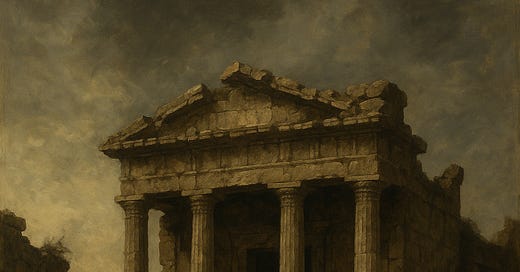When the House Lies in Ruins: A Reflection on the Book of Haggai
In the annals of Scripture, the Book of Haggai is often overlooked—just two chapters tucked quietly into the back of the Old Testament. Yet, its message reverberates with the thunder of divine urgency. It is a book for people who have grown spiritually weary, who have good intentions but misplaced priorities. It is a word from the Lord for those who claim to wait on His timing while neglecting His calling.
Haggai prophesied in 520 B.C., during a fragile time for the people of Judah. They had returned from Babylonian exile some eighteen years earlier with a bold decree to rebuild the Temple. The foundation was laid quickly—but then came the years of distraction, of opposition, of delay. The Temple remained unfinished, and the people turned to their own homes, their own fields, and their own comforts.
“Is it time for you yourselves to dwell in your paneled houses, and this temple to lie in ruins?” (Haggai 1:4, NKJV)
The Lord’s rebuke, spoken through the prophet, is not merely about a building—it is about the heart. The Temple was the visible sign of God’s presence among His people. Its abandonment reflected a deeper neglect of God Himself.
A Word in Due Season
Haggai's prophecy consists of four dated messages, each aimed at awakening the people to spiritual action. The first message is one of rebuke, but also of invitation:
“Consider your ways!” (1:5, 7)
They had sown much but harvested little. Their wages disappeared like coins through a hole in a purse. Why? Because God had withheld blessing until His house was given its due place.
The people responded. They resumed work on the Temple—timidly at first, but sincerely. And the second message came just a month later, during the Feast of Tabernacles. This one spoke to the discouraged:
“Who is left among you who saw this temple in its former glory?... Yet now be strong... for I am with you.” (2:3–4)
The new temple lacked the grandeur of Solomon’s, but God reminded them that His presence was the true glory. Moreover, He pointed to a future glory—a time when the nations would be shaken and “the Desire of All Nations shall come” (2:7), a clear Messianic promise ultimately fulfilled in Christ.
Holiness and the Heart
In Haggai’s third message, the focus shifts to holiness. The people were building again, but their hearts still needed sanctifying. Haggai asked the priests whether holiness could be transferred by proximity—and the answer was no. In contrast, uncleanness spreads easily. The lesson was plain: outward works do not cleanse an impure heart.
“So is this people... and so is every work of their hands.” (2:14)
Yet, God’s tone changes again: “From this day I will bless you.” (2:19). The promise of blessing always follows repentance and obedience.
Hope for the Future
Haggai’s final message is directed to Zerubbabel, the governor of Judah and descendant of David. God speaks not just of blessing, but of upheaval. He will shake the heavens and overthrow thrones. In the midst of this, He declares:
“I will make you like a signet ring; for I have chosen you.” (2:23)
Though Zerubbabel never became king, this prophecy finds its fulfillment in Jesus Christ, the Son of David, who is both Temple and King.
Why Haggai Still Matters
The Book of Haggai is not merely about a building project in the sixth century before Christ. It is a divine call to reorder our priorities, to rebuild what we have allowed to fall into neglect. Many of us, like the Jews of that day, are busy with life—our careers, our homes, our ministries even—while the deeper things of God are left unattended.
We decorate our houses but leave our souls undecorated with prayer.
We manage our calendars but neglect the rhythms of worship.
We build our kingdoms but forget His.
Haggai’s question is God’s question to us still:
“Is it time for you to dwell in your paneled houses while My house lies in ruins?”
In a world of distraction, Haggai calls us back to holy focus. In a time of spiritual confusion, he calls us back to clear obedience. In an age of uncertainty, he reminds us that God is still faithful, still present, and still building His Kingdom.
Let us, then, consider our ways—and rebuild.





